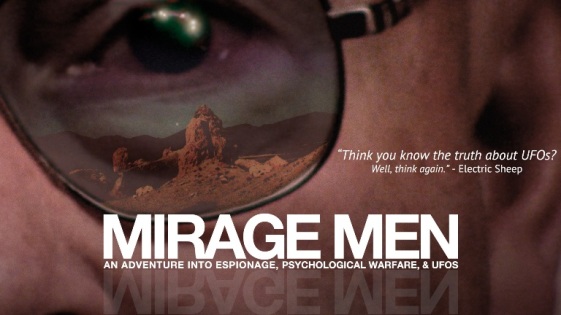[Minor Rock Fist Down]
 In the seminal 1990s television show, The X-Files, lead character/conspiracy theory enthusiast Fox Mulder (David Duchnovny) often espoused the mantra plastered on the U.F.O. poster hanging from his office’s wall: “I want to believe.” This unflinching belief in the fantastic, in what some might term the absurd, was the overriding theme of the television show. It followed F.B.I. Special Agent Mulder, a dogged investigator and alien abduction witness, on his quest to discover the truth about life on other planets, and the attempts of authority figures from this one to cover up that information.
In the seminal 1990s television show, The X-Files, lead character/conspiracy theory enthusiast Fox Mulder (David Duchnovny) often espoused the mantra plastered on the U.F.O. poster hanging from his office’s wall: “I want to believe.” This unflinching belief in the fantastic, in what some might term the absurd, was the overriding theme of the television show. It followed F.B.I. Special Agent Mulder, a dogged investigator and alien abduction witness, on his quest to discover the truth about life on other planets, and the attempts of authority figures from this one to cover up that information.
The central premise of Mirage Men, a documentary currently playing at the Seattle International Film Festival, is that all of this alien abduction hoopla, all this U.F.O. and conspiracy theory enthusiasm, is the intended byproduct of a deliberate government-sanctioned disinformation campaign. Put more simply: over the last 30-40 years, the U.S. Air Force and other government bodies have stoked the public’s fascination in U.F.O.s, and even encouraged a few of the more enthusiastic folks with false-leads. Mirage Men maintains that all of this was (is?) done to guide citizens away from actual, non-alien experimentation on sensitive military projects like unmanned drones and stealth technology.
It’s a fascinating premise, and makes a modicum of sense when looked at in terms of the practical realities of engaging in a global conspiracy to hide the truth about aliens. Indeed, one of the most glaring impracticalities of U.F.O. conspiracy theories is the need for far-reaching world-wide involvement of every nation in existence. After all, the whole alien cover-up thing doesn’t work if government leaders in Peru, Indonesia, or New Zealand (just a few random examples) aren’t on-board. It does sorta make sense, then, that what may have begun as a few random sightings ballooned into a counter-culture phenomenon: one encouraged by a select handful of government agencies utilizing an alien/U.F.O. fad to cover up legitimate research and technology development.
There’s desperately little in the way of hard evidence to back this up, however, and much of the documentary’s premise is based on hearsay, conjecture, and a logistic leap of faith that is conceivable, yet does stretch the imagination a bit. For example, wouldn’t it have made more sense to just level with the people who claimed to have seen U.F.O.’s rather than lead them on an elaborate, and sometimes dangerous, wild goose chase? Surely, it would not have made sense to tell these civilians exactly what they’d seen (a Stealth Bomber prototype, for example), but instead of spinning some fantastic yarn about aliens and flying saucers, why not just say, “it’s classified, sir. Revealing information or pictures of what you saw could lead to an espionage charge against you that the government will enforce.”

Boom: it’s that easy. Most people, after seeing something out of the ordinary near a military base (in the pre-X-Files days, anyway) would content themselves with that explanation along with a healthy fear of federal prosecution. So why create the elaborate, ongoing ruse of misinformation? Although it may have been effective at keeping a few eccentric witnesses off the proper path (and oblivious to actual military secrets), wouldn’t all the attention they generated, and the descriptions they gave about what they saw, do more harm than good?
The filmmakers behind Mirage Men, John Lundberg, Roland Denning, Kypros Kypianou, and Mark Pilkington, never explore this question, and it makes for a documentary that feels half-finished. Indeed, they posed a very interesting question with their picture, and as stated before, this misinformation campaign does make some sense when viewed in the context of the time period involved and the military technology at play, yet that’s what makes any conspiracy theory fun: that it COULD be true.
There’s just not enough here to support the idea that a majority of the modern U.F.O. sub-culture is the work of a few crafty agents working on behalf of the N.S.A., C.I.A., Air Force, and the like. And while one of these counterintelligence operatives, Richard Doty (U.S.A.F., ret.), has come forward to detail some of his work in this regard, as Mirage Men correctly points out, the testimony of an admitted liar and misinformation specialist is dubious, at best. The truth is further muddled by the fact that Doty states that he does believe that there are aliens out there, and that while he led people in circles for years on end, there really are visitors from outer space making trips to Earth.
So what have we got with Mirage Men? Was the whole U.F.O. craze a put-up job by the U.S. government to shield sensitive technology developments, or did this effort go hand-in-hand with a simultaneous effort to keep alien (as well as terrestrial) technology out of the public eye? There’s a lot of insinuation, winks, and nods, but again, nothing in the way of hard evidence or factual data to rely on. The documentary seems content to throw a lot of wild ideas at the wall, some of which are intriguing, yet none of these notions are explored fully or with a comprehensive hand that does justice to the material.
Credit should be given to the filmmakers for producing a movie with a passive message, for Mirage Men never comes out in support of an issue one way or the other. And while this ambivalence is generous in terms of the presentation of facts, it does little for the movie as a whole, and hampers the arguments put forth. Indeed, if the documentary doesn’t have enough hard evidence to make any kind of convincing argument, either for or against its premise, all that’s left is an intriguing idea that may as well be the premise of an X-File rerun. At least with Duchovny and his Agent Mulder, you knew exactly what you were getting. No such comforts are to be found in Mirage Men, however.






Comments on this entry are closed.